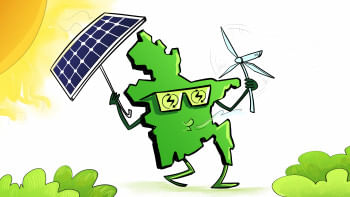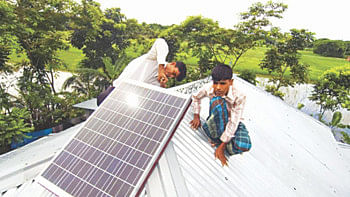Corruption is dimming solar power, too

The people of Rangamati, Bandarban and Khagrachhari were eagerly waiting to say goodbye to their electricity troubles, as they were set to receive free solar panels under a government initiative. However, as we have seen time and again, such well-intentioned initiatives often don't pan out as expected due to corruption. According to a report by this newspaper, locals, who are mostly poor, are being forced to pay Tk 300-7,000 in bribes to get a set of panels. This is absolutely unacceptable.
The project, undertaken by the CHT Development Board to bring all of Chittagong Hill Tracts (CHT) under electricity coverage, intends to distribute 65,000 solar systems in the three districts. Unfortunately, corrupt officials, ruling party leaders, and brokers are barring many from enjoying its fruits. By taking bribes, concerned officials and leaders are essentially working against the interests of their own communities, which just shows how ineligible they are to serve the people.
Without access to electricity, households are being deprived of a facility that can change lives, as education, businesses, and people's lifestyle in general are immensely dependent on it. Meanwhile, solar power has the potential to bridge this accessibility gap efficiently, because it can easily be deployed in hard-to-reach areas, without the need to run kilometres of cables. This renewable source is also an essential ally in the battle against climate change, as it can help bring emissions down by 45 percent within 2030, and reach net zero by 2050, as called for in the Paris Agreement. Despite this potential, the authorities seem quite nonchalant about the irregularities that are taking place.
Bangladesh has set ambitious targets in terms of renewable energy. It has pledged to generate 40 percent of electricity from renewable sources by 2041, a large percentage of which will be produced through solar power. But can we reach these targets if the administration can't even ensure that its own people are aligned with these goals? If such incidents continue, the promise of access to electricity for all will remain unfulfilled.


 For all latest news, follow The Daily Star's Google News channel.
For all latest news, follow The Daily Star's Google News channel. 










Comments